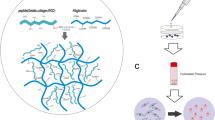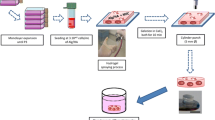Abstract
Alginate, as a natural polysaccharide hydrogel, is promising for tissue engineering and cell therapeutic strategies. The construction and properties of alginate scaffolds can be modified by divalent cations as cross-linkers during polymerization. The aim of this study was to investigate the viability and chondrogenic capacity of human Wharton’s jelly-derived mesenchymal stem cells (WJ-MSCs) immobilized on alginate capsules in the presence of BaCl2 or CaCl2. In this study, cell viability was evaluated by MTT assay and FDA/PI staining at 1, 10, and 21 days after encapsulation in two groups of calcium alginate (CA) and barium alginate (BA) microcapsules. The alginate microcapsules were stained by Safranin-O to evaluate newly synthesized glycosaminoglycans after 21 days of chondrogenic differentiation. The presence of Collagen-II was also assessed by the immunohistochemistry method. The stability of BA microcapsules was higher than the CA microcapsules. In FDA/PI staining and MTT test, the viability of the WJ-MSCs encapsulated in CA was considerably higher than the BA-encapsulated cells. Also, in the CA microcapsules, the differentiation ability of WJ-MSCs into the chondroblast-like cells was obviously increased. Immuno-staining of collagen-II and Safranin-O staining in the WJ-MSCs encapsulated in the CA was considerably higher than the BA-encapsulated cells. The results of this study showed that a three-dimensional CA culture system has the potential to create a small and suitable environment for the growth and chondrogenic differentiation of the WJ-MSCs.





Similar content being viewed by others
Data Availability
The authors confirm that the data supporting the findings of this study are available within the article.
References
Abbah S, Lu W, Peng S, Aladin D, Li Z, Tam WK, Cheung KMC, Luk KDK, Zhou GQ (2008) Extracellular matrix stability of primary mammalian chondrocytes and intervertebral disc cells cultured in alginate-based microbead hydrogels. Cell Transpl 17:1181–1192. https://doi.org/10.3727/096368908787236648
Abbasi N, Hamlet S, Love RM, Nguyen NT (2020) Porous scaffolds for bone regeneration. J Sci: Adv Mater Dev 5:1–9. https://doi.org/10.1016/j.jsamd.2020.01.007
Afara I, Singh S, Moody H, Oloyede A (2013) A comparison of the histochemical and image-derived proteoglycan content of articular cartilage. Anatom Physiol 3:120. https://doi.org/10.4172/2161-0940.1000120
Angelozzi M, Penolazzi L, Mazzitelli S, Lambertini E, Lolli A, Piva R, Nastruzzi C (2017) Dedifferentiated chondrocytes in composite microfibers as tool for cartilage repair. Front Bioeng Biotechnol 5:35. https://doi.org/10.3389/fbioe.2017.00035
Bhujbal SV, Paredes-Juarez GA, Niclou SP, De Vos P (2014) Factors influencing the mechanical stability of alginate beads applicable for immunoisolation of mammalian cells. J Mech Behav Biomed Mater 37:196–208. https://doi.org/10.1016/j.jmbbm.2014.05.020
Brun-Graeppi AKAS, Richard C, Bessodes M, Scherman D, Merten O-W (2011) Cell microcarriers and microcapsules of stimuli-responsive polymers. J Control Rel 149:209–224. https://doi.org/10.1016/j.jconrel.2010.09.023
Eledel RH, Elbatsh MM, Noreldin RI, Omar TA, Abu-Alata ZA (2020) Differentiation of mesenchymal stem cells into chondrocytes as a future therapy for skeletal diseases. Menoufia Med J 33:226–230. https://doi.org/10.4103/mmj.mmj_255_18
Focaroli S, Teti G, Salvatore V, Orienti I, Falconi M (2016) Calcium/cobalt alginate beads as functional scaffolds for cartilage tissue engineering. Stem Cells Int. https://doi.org/10.1155/2016/2030478
Francis SL, Bella CD, Wallace GG, Choong PFM (2018) Cartilage tissue engineering using stem cells and bioprinting technology-barriers to clinical tanslation. Front Surg 5:70. https://doi.org/10.3389/fsurg.2018.00070
Kim H, Bae C, Kook Y, Koh WG, Lee K, Park MH (2019) Mesenchymal stem cell 3D encapsulation technologies for biomimetic microenvironment in tissue regeneration. Stem Cell Res Ther 10:51. https://doi.org/10.1186/s13287-018-1130-8
Kolambkar YM, Peister A, Soker S, Atala A, Guldberg RE (2007) Chondrogenic differentiation of amniotic fluid-derived stem cells. J Mol Histol 38:405–413. https://doi.org/10.1007/s10735-007-9118-1
Liu Y, Lin C, Zeng Y, Li H, Cai B, Huang K, Yuan Y, Li Y (2016) Comparison of calcium and barium microcapsules as scaffolds in the development of artificial dermal papillae. Biomed Res Int. https://doi.org/10.1155/2016/9128535
Miyamoto K, An HS, Sah RL, Akeda K, Okuma M, Otten L, Thonar EJMA, Koichi Masuda K (2005) Exposure to pulsed low intensity ultrasound stimulates extracellular matrix metabolism of bovine intervertebral disc cells cultured in alginate beads. Spine 30:2398–2405. https://doi.org/10.1097/01.brs.0000184558.44874.c0
Moshaverinia A, Xingtian XuX, Chen C, Akiyama K, Snead ML, Shi S (2013) Dental mesenchymal stem cells encapsulated in alginate hydrogel co-delivery microencapsulation system for cartilage regeneration. Acta Biomater 9:9343–9350. https://doi.org/10.1016/j.actbio.2013.07.023
Pleumeekers MM, Nimeskern L, Koevoet WLM, Kops N, Poublon RML, van Osch GJ (2014) The in vitro and in vivo capacity of culture-expanded human cells from several sources encapsulated in alginate to form cartilage. Eur Cell Mater 27:264–280. https://doi.org/10.22203/ecm.v027a19
Rivero RE, Capella V, Liaudat AC, Bosch P, Barbero CA, Rodríguez N, Rivarola CR (2020) Mechanical and physicochemical behavior of a 3D hydrogel scaffold during cell growth and proliferation. RSC Adv 10:5827–5837. https://doi.org/10.1039/c9ra08162c
Safiri S, Hoy KAA, D, et al (2019) Global, regional and national burden of rheumatoid arthritis 1990–2017: a systematic analysis of the Global Burden of Disease study 2017. Ann Rheum Dis 2019(78):1463–1471. https://doi.org/10.1136/annrheumdis-2019-215920
Stefanska K, Ozegowska K et al (2020) Human wharton’s jelly-cellular specificity, stemness potency, animal models, and current application in human clinical trials. J Clin Med 9:1102. https://doi.org/10.3390/jcm9041102
Stölzel G, Schulze-Tanzil H, Olze S, Schwarz E, Feldmann M, Rotter N (2015) Immortalised human mesenchymal stem cells undergo chondrogenic differentiation in alginate and PGA/PLLA scaffolds. Cell Tissue Bank 16:159–170. https://doi.org/10.1007/s10561-014-9457-6
Strand BL, Mørch YA, Syvertsen KR, Espevik T, Skjåk-Bræk G (2003) Microcapsules made by enzymatically tailored alginate. J Biomed Mater Res A 64:540–550. https://doi.org/10.1002/jbm.a.10337
Troyer DL, Weiss ML (2008) Concise review: Wharton’s jelly-derived cells are a primitive stromal cell population. Stem Cells 26:591–599. https://doi.org/10.1634/stemcells.2007-0439
Vecchiatini R, Penolazzi L, Lambertini E, Angelozzi M, Morganti C, Mazzitelli S, Trombelli L, Nastruzzi C, Piva R (2015) Effect of dynamic three-dimensional culture on osteogenic potential of human periodontal ligament-derived mesenchymal stem cells entrapped in alginate microbeads. J Periodontal Res 50:544–553. https://doi.org/10.1111/jre.12225
Xu J, Wang W, Ludeman M, Cheng K, Hayami T, Lotz JC, Kapila S (2008) Chondrogenic differentiation of human mesenchymal stem cells in three-dimensional alginate gels. Tissue Eng Part A 14:667–680
Funding
The research grants (CMRC-9512) have been provided by the Research Council of Ahvaz Jundishapur University of Medical Sciences as MS. C thesis of Atieh Kord.
Author information
Authors and Affiliations
Contributions
DBN: supervision the study, acquisition, design of the work, and interpretation of data; SA: design of the work; AK: collection of data, and drafted the work; KA-A: performed data statistical analysis, LK: interpretation of data, and critical reviewing of the manuscript. All authors approved the submitted version.
Corresponding author
Ethics declarations
Conflict of interest
All authors declare that they have no conflict of interest.
Consent to Participate
All authors agree to participate in this research study.
Consent for Publication
There is not any consent for publication.
Ethics Approval
This study was performed based on ethical principles approved by the Ethics Committee of Ahvaz Jundishapur University of Medical Sciences, Iran (No: IR.AJUMS.REC.1395.434).
Rights and permissions
About this article
Cite this article
Bijan Nejad, D., Azandeh, S., Kord, A. et al. Calcium- and Barium-Alginate Effects on Chondrogenic Differentiation of Wharton’s Jelly-Derived Mesenchymal Stem Cells. Iran J Sci Technol Trans Sci 46, 1125–1134 (2022). https://doi.org/10.1007/s40995-022-01327-0
Received:
Accepted:
Published:
Issue Date:
DOI: https://doi.org/10.1007/s40995-022-01327-0




